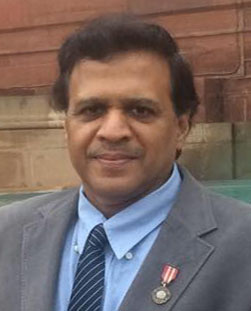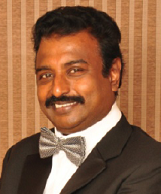Related Research Articles

Ophthalmology is a branch of medicine that deals with the diagnosis and treatment of eye disorders. An ophthalmologist is a physician who specializes in eye care. The credentials include a degree in medicine, followed by additional four to five years of residency training in ophthalmology. Residency training programs for ophthalmology may require a one-year internship with training in internal medicine, pediatrics, or general surgery. Additional specialty training may be sought in a particular aspect of eye pathology. Ophthalmologists are allowed to prescribe medications to treat eye diseases, implement laser therapy, and perform surgery when needed. Ophthalmologists typically provide specialty eye care - medical and surgical, and they may participate in academic research on eye disorders.
Apex Institute & R.I.O.s in India

Sankara Nethralaya is a not-for-profit missionary institution for ophthalmic care headquartered in Chennai, India. In the name "Sankara Nethralaya", "Sankara" is a reference to Adi Shankaracharya and "Nethralaya" means "The Temple of the Eye". Sankara Nethralaya receives patients from India and abroad. Sankara Nethralaya has over 1000 employees and serves around 1500 patients per day, performing over 100 surgeries per day. The annual revenue as per the taxes is close to US$100 million.

Minto Ophthalmic Hospital is a government run specialty hospital in Bangalore treating diseases of the eye. Minto Ophthalmic Hospital,, was established in 1896, making it one of the oldest speciality eye hospitals in the world. The Hospital was started in Chikkapete area in 1896, moved to Lalbagh lodge in 1897 and later shifted to the present building in 1913 which was constructed during the reign of Nalwadi Krishnaraja Wadiyar IV, the King of Mysuru state. It is affiliated to the Bangalore Medical College and Research Institute, and is an institution of national importance.
The Egmore Eye Hospital, officially the Regional Institute of Ophthalmology and Government Ophthalmic Hospital, is a public eye hospital in Chennai, India. Considered the oldest eye hospital in Asia, the institute was established in 1819 and is the second oldest hospital of its kind, next only to the Moorfields Eye Hospital in the United Kingdom.
Sengamedu Srinivasa Badrinath is the Indian founder and Chairman Emeritus of Sankara Nethralaya, Chennai, one of India's largest charitable eye hospitals. He is an elected fellow of the National Academy of Medical Sciences. He received the Padma Bhushan, third-highest civilian award in the Republic of India in 1996. He also received many other awards, including Padma Shri and Dr. B. C. Roy Award.
Taraprasad Das is an Indian ophthalmologist, who specializes in diseases of the retina and vitreous membrane. He is currently the Vice-Chairman of the L.V.Prasad Eye Institute. He is professor of ophthalmology at the Sun Yet-sen University of Medical Sciences in Guangzhou, China.
Noshir Minoo Shroff is an Indian ophthalmologist, known as a pioneer of intraocular lens implantation surgery in India and a medical director of the Shroff Eye Centre. The Government of India honoured him in 2010, with the Padma Bhushan, the third highest civilian award, for his services in the field of medicine.
Jeewan Singh Titiyal is an Indian ophthalmologist, credited with the first live cornea transplant surgery by an Indian doctor. He was honoured by the Government of India, in 2014, by bestowing on him the Padma Shri, the fourth highest civilian award, for his services to the field of medicine.
Gullapalli Nageswara Rao is an Indian ophthalmologist, the chairman of the Academia Ophthalmologica Internationalis (AOI) and the founder of the L. V. Prasad Eye Institute, Hyderabad. A former Associate Professor at the School of Medicine and Dentistry of the University of Rochester, Rao is a Fellow of the National Academy of Medical Sciences, India. He was honored by the Government of India, in 2002, with the fourth highest Indian civilian award of Padma Shri. He was elected in 2017 to the Ophthalmology Hall of Fame instituted by the American Society of Cataract and Refractive Surgery.

Yog Raj Sharma is an Indian ophthalmologist and ex-Chief of Dr. Rajendra Prasad Centre for Ophthalmic Sciences of the All India Institute of Medical Sciences (AIIMS), New Delhi, the apex body of the National Programme for the Control of Blindness, a Government of India initiative to reduce the prevalence of blindness in India. He is the Chairman of the Task Force on Prevention and Control of Diabetic Retinopathy Group and the Co-Chairman of the National Task Force on Prevention of Blindness from Retinopathy of Prematurity under the Ministry of Health and Family Welfare of the Government of India. An advisor to the Ministry of Health and Family Welfare, India, Sharma was honoured by the Government of India in 2015 with Padma Shri, the fourth highest Indian civilian award. Yog Raj Sharma's published article on " Pars plana VITRECTOMY Vs scleral BUCKLING Inrhegmatogenous retinal detachment" in 2005 in Acta OPHTHALMOLOGICA SCANDINAVICA was cited in top 100 publications on retinal detachment management in the last ~121 years in the lead article in journal of American society of retina SPECIALISTS in November issue in 2021. Yog Raj Sharma was the first author and primary surgeon in study patients. Coauthors in the study included Dr Dr Sathiyan, Rajvardhan Azad, Deependra V Singh, Rajpal Vohra, Nikhi Pal, Parijat Cahandra . Dr Sharma called it 'the singular biggest achievement of his career" in an article published in Daily Excelsior,jammu in December, 2021. Of these top hundred publications on RETINAL detachment management, only nineteen countries contributed of 196 countries, three of the CONTRIBUTing countries were Asian and from India this study was the sole contribution. Because it is such singular achievement for me of my career, I would wish it CITED in my Wikipedia biography . If any clarifications etc are required,my email is yograjsharma@yahoo.com and my cell number is 17036157113; Whattsapp number is +919958114551. Thanks . Yog Raj Sharma
Janardan Shankar Mahashabde was an Indian ophthalmologist. He was the founder of Mahashabde Netralaya and the Indore Eye Hospital. He was one of the early members of the Indore Divisional Ophthalmologist Society (IDOS). The Government of India awarded him the fourth highest civilian honour of the Padma Shri in 1992. The All India Ophthalmological Society has instituted an award, Mahashabde Award, in memory of the ophthalmologist.
Mahipal S. Sachdev is an Indian ophthalmologist and the Chairman of Centre for Sight, a chain of Eye Hospitals in India. He is known as one of the pioneers of Phacoemulsification procedure in India. He is the co-author of A Practical Guide to Phacoemulsification, the first Indian book on the topic. The Government of India awarded him the fourth highest civilian honour of the Padma Shri, in 2007, for his contributions to Indian medicine. He is the Chairman Scientific Committee of the Intraocular Implant and Refractive Society of India, IIRSI.
Keiki R. Mehta, an Indian ophthalmologist, medical researcher and writer, is considered by many as the father of Phacoemulsification in India. He is the Chief Surgical and Medical Director at Mehta International Eye Institute, a Mumbai-based specialty eye hospital founded by him. He is known to be the first surgeon to perform a Radial keratotomy in India and is credited with the development of the first soft eye implant in the world, and the Keiki Mehta BP Valve Glaucoma Shunt, a medical implant used in the treatment of neovascular‚ congenital and uveitic glaucoma. He is a recipient of several honours including the Grand Honors Award of the National Eye Research Foundation, Chicago and the Triple Ribbon Award of the American Society for Cataract and Refractive Surgery. The Government of India awarded him the fourth highest civilian honour of the Padma Shri, in 2008, for his contributions to Medicine.

Dr. Vikas Mahatme is Padmashri Awarded Indian ophthalmologist, social entrepreneur, visionary and a member of the Parliament in Rajya Sabha. Born in Amravati, he comes from Nagpur in the state of Maharashtra. He is well known across Maharashtra for his charitable and social works. He founded a charitable trust – S. Mahatme Eye Welfare Charitable Trust that runs Mahatme Eye Bank eye hospital in Nagpur as well as branches in Mumbai, Amravati, Gadchiroli and Pune. He received the Padma Shri for his charitable community work as an ophthalmologist. In June 2016, Mahatme was the Bharatiya Janata Party's candidate for the Rajya Sabha biennial elections, which he won unopposed. His candidature was strongly backed by Maharashtra Chief Minister Devendra Fadnavis and Union Minister Nitin Gadkari. He belongs to the Dhangar community. He has expressed support for implementing Scheduled Tribe reservation for Dhangar community in Maharashtra and is its first community member to get elected to parliament. He is currently a member of the Indian Nursing Council.
Dukhan Ram (1899–1990) was an Indian ophthalmologist, academic, legislator and the vice chancellor of Babasaheb Bhimrao Ambedkar Bihar University. He was the principal of Patna Medical College, one of the oldest medical colleges in India, and the president of Arya Pradeshik Pratinidhi Sabha, a satellite organization of Arya Samaj, founded by Dayanand Saraswati. He successfully contested the 1962 Bihar Legislative Assembly election from Sasaram constituency, on Indian National Congress candidature and served as the president of All India Ophthalmological Society in 1961. The Government of India awarded him the third highest civilian honour of the Padma Bhushan, in 1962, for his contributions to medical science.
Anil Kumar Mandal is an Indian ophthalmologist and a consultant at L. V. Prasad Eye Institute, Hyderabad. Known for his research on glaucoma, Mandal is an elected fellow of the National Academy of Medical Sciences. The Council of Scientific and Industrial Research, the apex agency of the Government of India for scientific research, awarded him the Shanti Swarup Bhatnagar Prize for Science and Technology, one of the highest Indian science awards, for his contributions to Medical Sciences in 2003.

Atul Kumar is an Indian ophthalmologist who is currently the Chief & Professor of Ophthalmology at Dr. Rajendra Prasad Centre for Ophthalmic Sciences (RPC-AIIMS), the national apex ophthalmic centre at All India Institute of Medical Sciences, Delhi. He was awarded the Padma Shri award in January 2007 for his services to the medical field. He specializes in vitreoretinal surgery and also heads the Vitreo-Retinal, Uvea and ROP services at RPC-AIIMS.

Sundaram Natarajan is an Indian ophthalmologist. In 2002, he started a free clinic in Dharavi, a slum in Mumbai, and treated more than 8,000 people. He has also held free camps in various other suburbs of Mumbai such as Mankhurd and Govandi to treat the economically poor. In 2016, he also held a camp in Kashmir to operate and cure the victims of pellet gun firings.
Dr. Jagat Ram is an ophthalmologist and former director of Postgraduate Institute of Medical Education and Research (PGIMER) Chandigarh, India.
References
- ↑ http://www.nioeyes.com/ The National Institute of Ophthalmology
- ↑ "Who We Are".